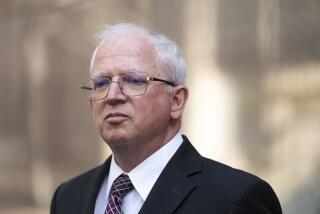Kaczynski Defense’s Pretrial Scrambling May Signal Disarray
- Share via
SACRAMENTO — Stepped-up legal maneuvering in recent weeks by attorneys for Unabomber suspect Theodore Kaczynski suggests to some experts that the defense strategy may be falling apart on the eve of his murder-by-bombing trial.
“Probably the most significant thing we’ve come to realize is the disarray the defense is in,” said Joshua Dressler, a professor at McGeorge Law School in Sacramento.
He and other legal experts cited a rapid-fire series of developments that peaked Monday with an abrupt change in defense tactics.
First, Kaczynski has steadfastly refused to budge from his refusal to be examined by government mental health experts. Apparently upset with suggestions from his lawyers that he is mentally ill, Kaczynski has forced several closed-door sessions with the judge to air differences with his legal team.
Even with that rift apparently healed, at least for now, the behind-the-scenes defense struggle continued to heat up in recent days.
Over the weekend, it was disclosed that defense attorneys had sought a deal with the government to spare their client from death row in exchange for a guilty plea. Prosecutors rejected such a plea bargain.
Then, on Monday, defense lawyers switched their plans for the trial’s guilt phase, just a week before opening statements are scheduled to start.
In a one-sentence filing, they abruptly dropped plans to use psychiatrists to argue a variation of the diminished capacity defense. The defenders had hoped to put on experts to say that Kaczynski doesn’t have the necessary criminal intent to be guilty in the four bomb attacks he is charged with in U.S. District Court.
Abandoning testimony from mental health experts, Dressler maintained, “is a demonstration of the extent to which Mr. Kaczynski is undermining their best efforts to prepare for and conduct this trial.
“I don’t think they thought they had any shot at winning the diminished capacity claim. . . . What they wanted to do is to begin to teach jurors about his mental illness,” said Dressler, who has observed some of the court proceedings.
Laurie Levenson, associate dean at Loyola Law School in Los Angeles, said she didn’t think dropping the mental defense “was a big deal.”
“They didn’t lose anything because they weren’t going to get their experts to testify anyway. Without Kaczynski submitting to an examination [by the government], it was highly unlikely the judge was going to allow the defense experts to testify.”
Dressler and other attorneys say Kaczynski lawyers Quin Denvir and Judy Clarke are left with using their client’s tiny cabin--recently shipped to Sacramento on a flatbed truck from Montana--to raise questions about his state of mind in the trial’s opening act.
“The cabin itself is significant circumstantial evidence that he has real discernible mental problems,” said Sacramento attorney David W. Dratman, a former federal public defender who has attended some court sessions. Defenders hope to show jurors the cramped wooden shack, which is not much bigger than a walk-in closet.
“This is an educated man who has woven a world in a tiny space that is a different world than our world,” Dratman said of the former UC Berkeley mathematics professor.
Kaczynski was arrested, bedraggled and wild-eyed, in April 1996 at his cabin. He was charged in connection with four bomb attacks that killed two men in Sacramento and seriously injured two academicians in Tiburon, Calif., and New Haven, Conn.
Prosecutors say they found a mountain of evidence, including Kaczynski’s own writings, in the cabin. A month ago, they released dramatic excerpts from Kaczynski’s journals in which he revealed that he intended “to start killing people” and compared himself to infamous Texas sniper Charles Whitman.
The prosecution made that filing a week after Kaczynski, 55, strode into court for the opening of jury selection. He looked much more like a former college mathematics professor, with a neatly trimmed beard, open-collar shirt and slacks. He has pleaded not guilty.
Throughout the jury selection, Kaczynski usually sat between members of his defense team, sometimes chatting, sometimes smiling and hardly, if ever, looking at the spectators. Once, however, when the issue of his mental illness was raised, he threw a pen.
Kaczynski’s attorneys were unavailable for comment Tuesday.
Over more than five weeks, the anonymous panel of 12 jurors and six alternates was selected by the defense and prosecution teams. On Tuesday, the jury lost a woman and gained a man after a juror who was between jobs was excused because of financial hardship.
Dressler praised Kaczynski’s legal team, in part, for the way it selected jurors. He said the defense wound up with several jurors who he believes will be hard to persuade to recommend a death sentence for Kaczynski should he be found guilty.
Still, it remains unclear exactly what the jury will be told in Kaczynski’s defense in the opening phase of the trial.
That’s not unusual in such a complex case, Levenson said.
The last-minute move, she said, “points out this was a tough case for the defense in the beginning and it hasn’t gotten any easier. And strategy questions come to a climax on the eve of the trial.”
As if the defense didn’t have enough trouble, a local newswoman said Kaczynski’s lawyers were trying to prevent her from meeting with their client. Defense lawyers said Kaczynski would “contact her if and when he wishes to speak with her.”
More to Read
Sign up for Essential California
The most important California stories and recommendations in your inbox every morning.
You may occasionally receive promotional content from the Los Angeles Times.











